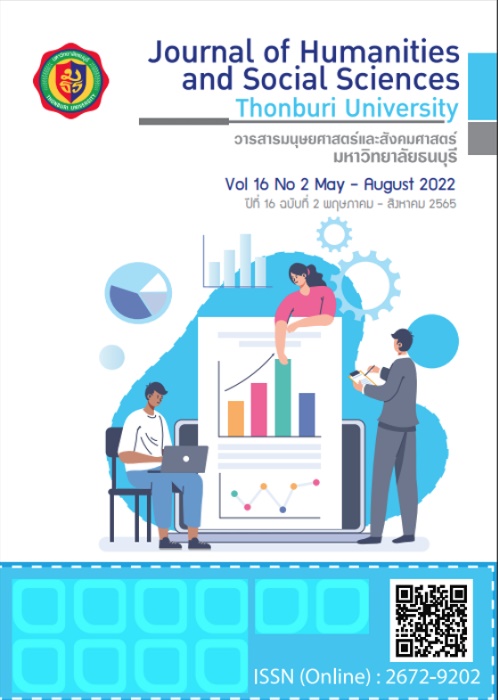ปัจจัยการบริหารจัดการตามแนวคิด 7S ของแมคคินซีย์ที่ส่งผลต่อการเป็นองค์การ แห่งการเรียนรู้ของธุรกิจโรงแรมในประเทศไทย
คำสำคัญ:
การบริหารจัดการองค์การ, แนวคิด 7S ของแมคคินซีย์, องค์การแห่งการเรียนรู้, ธุรกิจโรงแรมบทคัดย่อ
การวิจัยนี้มีวัตถุประสงค์ เพื่อศึกษาปัจจัยการบริหารจัดการตามแนวคิด 7S ของแมคคินซีย์ที่ส่งผลต่อการเป็นองค์การแห่งการเรียนรู้ของธุรกิจโรงแรมในประเทศไทย การวิจัยครั้งนี้ใช้การวิจัยเชิงปริมาณโดยเก็บข้อมูลจากกลุ่มตัวอย่างซึ่งเป็นพนักงานโรงแรมจำนวน 400 ตัวอย่างด้วยแบบสอบถามจากโรงแรมระดับ 5 ดาวในประเทศไทย
ผลการวิจัยพบว่า ผู้ตอบแบบสอบถามส่วนมากเป็นเพศหญิงร้อยละ 61.25 มีอายุ 31-40 ปีมากที่สุดคิดเป็นร้อยละ 41.00 สถานภาพโสดร้อยละ 58.75 ระดับการศึกษาในระดับปริญญาตรีร้อยละ 71.25 ประสบการณ์ทำงานด้านโรงแรมตั้งแต่ 5-10 ปีคิดเป็นร้อยละ 44.50 และแผนกต้อนรับมีจำนวนมากที่สุดคิดเป็นร้อยละ 20.50
ผลการทดสอบสมมติฐานพบว่า ปัจจัยการบริหารจัดการตามแนวคิด 7S ของแมคคินซีย์ส่งผลต่อการเป็นองค์การแห่งการเรียนรู้ของธุรกิจโรงแรมในประเทศไทย หากพิจารณารายด้านจากมากไปน้อย ผลการวิจัยพบว่า ค่านิยมร่วม
(p = 0.000*) ทักษะ (p = 0.000*) และระบบ (p = 0.002*) สามารถพยากรณ์การเป็นองค์การแห่งการเรียนรู้ของธุรกิจโรงแรมในประเทศไทยได้อย่างมีนัยสำคัญทางสถิติที่ระดับ 0.05 ในทางกลับกันด้านกลยุทธ์ โครงสร้าง รูปแบบการบริหาร และพนักงาน ไม่ส่งผลต่อการเป็นองค์การแห่งการเรียนรู้ของธุรกิจโรงแรมในประเทศไทย
เอกสารอ้างอิง
กระทรวงการท่องเที่ยวและกีฬา. (2565). สถิตินักท่องเที่ยวชาวต่างชาติที่เดินทางเข้าประเทศไทย ปี 2563-2564. สืบค้นเมื่อ 16 กุมภาพันธ์ 2565, จาก https://www.mots.go.th
กัลยา วานิชย์บัญชา; และ ฐิตา วานิชย์บัญชา. (2561). การใช้ SPSS for Windows ในการวิเคราะห์ข้อมูล. กรุงเทพฯ: โรงพิมพ์สามลดา.
ไข่มุกด์ วิกรัยศักดา, เฉลิมชัย กิตติศักดิ์นาวิน; และ สุพิตา ไพบูลย์วงศ์สกุล. (2564). การจัดการประสบการณ์ลูกค้า: ข้อเสนอ ใหม่สำหรับการพัฒนาโรงแรมบูติคไทย. วารสารเกษมบัณฑิต, 22(2), 54-71.
จันทร์เจ้า สุภรรุ่งเจริญ; และ ทิพย์รัตน์ เลาหวิเชียร. (2564). ความสัมพันธ์ระหว่างความรับผิดชอบต่อสังคมที่มีต่อภาพลักษณ์ตราสินค้า และความภักดีในตราสินค้าของกลุ่มโรงแรมใบไม้เขียว. วารสารวิชาการ มหาวิทยาลัยหอการค้าไทย มนุษยศาสตร์และสังคมศาสตร์, 41(4), 27-43.
ฐิติมา หรั่งกลาง; และ จิรศักดิ์ จิยะจันทน์. (2561). รูปแบบการจัดองค์กรแห่งการเรียนรู้ของธุรกิจโรงแรม. วารสารมนุษยศาสตร์และสังคมศาสตร์ มหาวิทยาลัยราชภัฏสุรินทร์. 20(2), 253-266.
นครินศร์ จับจิตต์. (2562). ปัจจัยที่มีอิทธิพลต่อองค์กรแห่งการเรียนรู้ในสถานศึกษาสังกัดสานักงานเขตพื้นที่การศึกษาประถมศึกษาพระนครศรีอยุธยา. ครุศาสตรมหาบัณฑิต, มหาวิทยาลัยราชภัฏวไลยอลงกรณ์.
นภาพร หงษ์ภักดี; และ สืบพงศ์ หงษ์ภักดี. (2564). รู้เพื่อรอดทางออกสำหรับธุรกิจโรงแรม. Journal of Roi Kaensarn Academi, 6(6), 357-369.
พัชรกันย์ เมธาอัครเกียรติ; และ ประสพชัย พสุนนท์. (2561). ปัจจัยที่ส่งผลต่อการเป็นองค์การแห่งการเรียนรู้ของสำนักงานคณะกรรมการการศึกษาขั้นพื้นฐาน. Veridian E-Journal, 11(1), 1944-1960.
สถิตย์ กุลสอน, ยืนยง ไทยใจดี; และ ชานนท์ เศรษฐแสงศรี. (2563). รูปแบบความสัมพันธ์เชิงสาเหตุปัจจัยที่มีอิทธิพลต่อการเป็นองค์กรแห่งการเรียนรู้ของวิทยาลัยสันตพล. วารสารมหาวิทยาลัยราชภัฎยะลา, 15(1), 12-20.
สมนึก เอื้อจิระพงษ์พันธ์, เยี่ยมดาว ณรงคะชวนะ; และ ยุทธชัย ฮารีบิน. (2561). การจัดการความรู้ และความผูกพันต่อองค์การที่ส่งผลต่อการเป็นองค์การแห่งการเรียนรู้ขององค์การที่มีผลการดำเนินงานด้านนวัตกรรมการศึกษาเชิงประจักษ์ธุรกิจ โรงแรมในประเทศไทย. วารสารพัฒนบริหารศาสตร์, 58(3), 130-154.
สมาคมโรงแรมไทย. (2564). รายชื่อโรงแรม/รีสอร์ท ที่ได้รับการรับรองมาตรฐานที่พักเพื่อการท่องเที่ยว. สืบค้นเมื่อ 13 ตุลาคม 2564, จาก http://www.thaihotels.org/16750781
สมาคมโรงแรมไทย. (2565). แบบประเมินมาตรฐานที่พักเพื่อการท่องเที่ยว. สืบค้นเมื่อ 20 เมษายน 2565, จาก http:// www.thaihotels.org/16747351
สำนักงานปลัดกระทรวงการท่องเที่ยวและกีฬา. รายงานภาวะเศรษฐกิจการท่องเที่ยว. สืบค้นเมื่อ 11 กุมภาพันธ์ 2565, จาก https://www.mots.go.th/download/TourismEconomicReport/4-1TourismEconomicVol4.pdf.
สุตาภัทร แก้วคัลณา; และ วิไลลักษณ์ อยู่สำราญ. (2564). การศึกษาปัจจัยที่สนับสนุนการเป็นองค์การแห่งการเรียนรู้:กรณีศึกษา สถาบันวิจัยระบบสาธารณสุข. วารสารสังคมภิวัฒน์, 12(3), 41-56.
สุปรียา ม่วงรอด. (2563). แนวทางการรักษาบุคลากรเจนเนอเรชั่นวายในธุรกิจโรงแรมขนาดกลางพื้นที่กรุงเทพมหานคร. การจัดการมหาบัณฑิต, สถาบันบัณฑิตพัฒนบริหารศาสตร์.
สุภะรัฐ ยอดระบำ; และ ศิรภัสสรศ์ วงศ์ทองดี. (2562). ปัจจัยที่มีอิทธิพลต่อการเป็นองค์การแห่งการเรียนรู้ของเทศบาลไทย. วารสารรัฐศาสตร์ปริทรรศน์ มหาวิทยาลัยเกษตรศาสตร์, 6(2), 133-156.
Abas, N., & Basri, R. (2019). Relationship between the dimensions of senior subject teachers’(GKMP) instructional leadership and the learning organisation at schools. International Research Journal of Education and Sciences (IRJES), 3, 2550-2158.
Cochran, W.G. (1953). Sampling Techiques. New York: John Wiley & Sons. Inc.
Goula, A., Stamouli, M. A., Latsou, D., Gkioka, V., & Sarris, M. (2020). Validation of Dimensions of Learning Organization Questionnaire (DLOQ) in health care setting in Greece. Journal of public health research, 9(4), 517-522.
Khiew, K. F., Chen, M., Shia, B. C., & Pan, C. H. (2020). The Implementation of Adopted Balanced Scorecard with New Insight Strategy Framework for the Healthcare Industry: A Case Study. Open Journal of Business and Management, 8(2), 600-627.
Makhonge, J. (2017). Strategy Implementation at Safari Park Hotel and Casino. Doctoral dissertation, University of Nairobi.
Mhlongo, P. M., & Zondo, R. W. D. (2021). Perception on the Application of a Learning Organisation Philosophy on Employee Performance at a selected University of Technology (UoT) in KwaZulu-Natal. PSYCHOLOGY AND EDUCATION, 58(2), 6690-6699.
Modi, S. S. (2017). Learning organization as a strategy for enabling business efficacy with reference to manufacturing & service sector companies in Pune region. Doctoral dissertation, Tilak Maharashtra Vidyapeeth.
Senge, P.M. (1990). The fifth discipline: the Art & Practice of Learning Organization. Doupleday Currence, New York.
Sharma, J., & Andotra, N. (2020). Exploring the Mediation Impact of Innovation and Adaptation to Change in Learning Organisation-Performance Outcomes. OPUS: HR Journal, 11(2), 45-64.
Waterman Jr, R. H., Peters, T. J., and Phillips, J. R. (1980). Structure is not organization. Business horizons, 23(3), 14-26.
Translated Thai References
Aujirapongpan, S., Narangajavana, Y.; & Hareebin, Y. (2018). The Knowledge Management and Employee Engagement On The Organization Learning of the Organization’s Performance in Innovation The Empirical Study of Hotel business in Thailand. NIDA Development Journal, 58(3), 130-154. (in Thai)
Bangkok. Master of Management, National Institute of Development Administration. (in Thai)
Hongphakdi, N.; & Hongphakdi, S. (2561). Know How to Survive Hotel Business Solution. Journal of Roi Kaensarn Academi, 6(6), 357-369. (in Thai)
Jubjit, N. (2019). Factors Affecting Learning Organizations in Schools Under Phra Nakhon Si Ayutthaya Primary Educational Service Area Office. Master of Education, Valaya Alongkorn Rajabhat University. (in Thai)
Kaewkalana, S.; & Yusamran, W. (2021). Factors Supporting Learning Organization :A Case Study Of Health Systems Research Institute. Journal of Social Synergy, 12(3), 41-56. (in Thai)
Kulson, S., Thaijaidee, Y.; & Sethasangsri, C. (2020). A Model of Causal Relations Affecting to Learning Organization of Santapol College. Journal of Yala Rajabhat University, 15(1), 12-20. (in Thai)
Langklang, T.; & Jiyachan, J. (2018). The Model of Learning Organization for Hotels Business. Journal of Humanities and Social Sciences Surin Rajabhat University. 20(2), 253-266. (in Thai)
Methaakkarakiat, P.; & Phasunon, P. (2018). Factors Affecting Learning Organization of The Office of Basic Education Commission. Veridian E-Journal, 11(1), 1944-1960. (in Thai)
Ministry of Tourism and Sports. (2022). Division of Tourism and Sports Economy. Statistics of foreign tourists entering Thailand in 2020-2021. Retrieved February 16, 2022, from https://www.mots.go.th (in Thai)
Muangrod, S. (2020). Guideline for Retaining Generation Y Staff in The Medium-Sized Hotel Business in
Office of the Permanent Secretary, Ministry of Tourism and Sports. Tourism Economic Review. Retrieved 11 February 2022, from https://www.mots.go.th/download/TourismEconomicReport/4-1TourismEconomic Vol4.pdf. (in Thai)
Suparungcharoen, C.; & Laohawichian, T. (2021). The Relationship between Corporate Social Responsibility to the Brand Image and Brand Loyalty of Green Leaf Hotel Group. University of the Thai Chamber of Commerce Journal Humanities and Social Sciences, 41(4), 27-43. (in Thai)
Thai Hotels Association. (2021). List of hotels/resorts Accredited accommodation standards for tourism. Retrieved October 13, 2021, from http://www.thaihotels.org/16750781 (in Thai)
Thai Hotels Association. (2022). Tourism Accommodation Standards Assessment Form. Retrieved 20 April 2022, from http://www.thaihotels.org/16747351 (in Thai)
Wanichbuncha, K., & Wanichbuncha, T. (2018). Using SPSS for Windows in data analysis. Bangkok: Samlada Printing House. (in Thai)
Wikraisakda, K., Kittisaknawin, C.; & Paiboonwongsakul, S. (2021). Customer Experience Management: A New Proposals for Thai Boutique Hotels Development. Kasem Bundit Journal, 22(2), 54-71. (in Thai)
Yodrabam, S.; & Wongthongdee, S. (2019). Factors Influencing Learning Organization in the Thai Municipalities. Political Science Journal Kasetsart University, 6(2), 133-156. (in Thai)
ดาวน์โหลด
เผยแพร่แล้ว
รูปแบบการอ้างอิง
ฉบับ
ประเภทบทความ
สัญญาอนุญาต
ลิขสิทธิ์ (c) 2022 นันทวัฒน์ พรเลิศกชกร, กานต์จิรา ลิมศิริธง, บุรินทร์ สันติสาส์น

อนุญาตภายใต้เงื่อนไข Creative Commons Attribution-NonCommercial-NoDerivatives 4.0 International License.
ผลงานที่ปรากฎในวารสารฉบับนี้เป็นลิขสิทธิ์เฉพาะส่วนบุคคลของผู้เขียนซึ่งต้องรับผิดชอบต่อผลทาง กฎหมายที่อาจเกิดขึ้นได้และไม่มีผลต่อกองบรรณาธิการ






